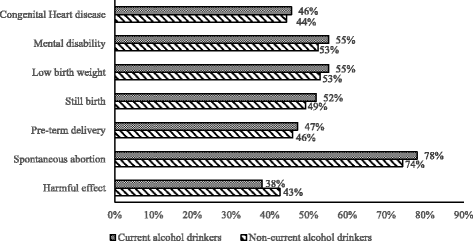Alcohol consumption among pregnant women in James Town Community, Accra, Ghana
- PMID: 28950877
- PMCID: PMC5615456
- DOI: 10.1186/s12978-017-0384-4
Alcohol consumption among pregnant women in James Town Community, Accra, Ghana
Abstract
Background: Alcohol consumption among pregnant women is a public health concern, considering its adverse outcomes for both mother and the developing foetus. This study examined factors that facilitate prenatal alcohol consumption, knowledge of adverse outcomes of prenatal alcohol exposure and alcohol expenditure among pregnant women in an urban community in Ghana.
Methods: In June 2014, a survey was conducted among 250 pregnant women sampled from James Town, an urban community in the Greater Accra Region of Ghana. Data were collected through face-to-face interviews and descriptive statistics conducted. The prevalence of alcohol consumption among women was determined. Pearson chi-square was used to determine associations between variables where necessary.
Results: Fifty-four percent of the pregnant women were aged 20 - 29 years. Seventy-three percent reported that they have ever consumed an alcoholic beverage before pregnancy. Of these, 77% take alcohol "once a while" and 48% reported taking alcohol during pregnancy. Most of the pregnant women (53%) who currently consume alcoholic beverages had it from friends, and their main reason for prenatal alcohol consumption was socialization (39%). Majority of both current alcohol drinkers (78%) and non-current alcohol drinkers (74%) were aware that prenatal alcohol consumption can lead to spontaneous abortion. Additionally, current alcohol drinkers spend averagely GHS 4.54 (SD 4.63) on their favourite alcoholic drink and overall, also spend averagely GHS 4.63 (SD 4.82) on their entire alcoholic beverage weekly. Over two-thirds (63%) of women reported monthly average income of less than GHS200.
Conclusion: This study shows high prenatal alcohol consumption in James Town, Accra, despite pregnant women's knowledge of its adverse effects on the developing foetus. Alcohol is usually sourced from friends with socialization noted as a major reason for prenatal alcohol consumption. These results could be used to inform future health advocacies and policies on prenatal alcohol exposure and maternal and child health interventions in the country.
Keywords: Alcohol consumption; Alcohol users; Alcoholic beverage; Ghana; Pregnant women.
Conflict of interest statement
Ethics approval and consent to participate
Ethical approval for the study was obtained from the Ghana Health Service Ethics Review Board with the Ethics Approval Certificate Identification number (GHS-ERC: 53/04/14). Permission was also given by the Health Administration of Ashiedu Keteke Sub Metro. The purpose of the study was explained to respondents and their written consent was given.
Consent for publication
Not applicable.
Competing interests
The authors declare that they have no competing interest.
Publisher’s Note
Springer Nature remains neutral with regard to jurisdictional claims in published maps and institutional affiliations.
Figures
Similar articles
-
Consumption and drinking frequency of alcoholic beverage among women in Ghana: a cross-sectional study.BMC Public Health. 2015 Apr 1;15:317. doi: 10.1186/s12889-015-1651-3. BMC Public Health. 2015. PMID: 25879511 Free PMC article.
-
Factors associated with alcohol consumption: a survey of women childbearing at a national referral hospital in Accra, Ghana.Afr J Reprod Health. 2014 Jun;18(2):152-65. Afr J Reprod Health. 2014. PMID: 25022153
-
Alcohol consumption among low-income pregnant Latinas.Alcohol Clin Exp Res. 2005 Nov;29(11):2022-8. doi: 10.1097/01.alc.0000187160.18672.f9. Alcohol Clin Exp Res. 2005. PMID: 16340460
-
A critical review of public health interventions aimed at reducing alcohol consumption and/or increasing knowledge among pregnant women.Drug Alcohol Rev. 2015 Mar;34(2):154-61. doi: 10.1111/dar.12152. Epub 2014 May 20. Drug Alcohol Rev. 2015. PMID: 24840708 Review.
-
Methods women use for induced abortion and sources of services: insights from poor urban settlements of Accra, Ghana.BMC Womens Health. 2021 Aug 16;21(1):300. doi: 10.1186/s12905-021-01444-9. BMC Womens Health. 2021. PMID: 34399739 Free PMC article. Review.
Cited by
-
Alcohol consumption and associated factors among pregnant women attending antenatal care at governmental hospitals in Harari regional state, Eastern, Ethiopia.Subst Abuse Treat Prev Policy. 2023 Oct 31;18(1):61. doi: 10.1186/s13011-023-00567-6. Subst Abuse Treat Prev Policy. 2023. PMID: 37904208 Free PMC article.
-
The prevalence and associated factors of alcohol use among pregnant women attending antenatal care at public hospitals Addis Ababa, Ethiopia, 2019.BMC Psychiatry. 2020 Jun 29;20(1):337. doi: 10.1186/s12888-020-02747-1. BMC Psychiatry. 2020. PMID: 32600291 Free PMC article.
-
Dietary patterns and associated factors among pregnant women in Ibadan, Nigeria: Evidence from Ibadan pregnancy cohort study.PLoS One. 2022 Sep 15;17(9):e0273796. doi: 10.1371/journal.pone.0273796. eCollection 2022. PLoS One. 2022. PMID: 36107862 Free PMC article.
-
The epidemiology of khat (catha edulis) chewing and alcohol consumption among pregnant women in Ethiopia: A systematic review and meta-analysis.PLOS Glob Public Health. 2023 Sep 15;3(9):e0002248. doi: 10.1371/journal.pgph.0002248. eCollection 2023. PLOS Glob Public Health. 2023. PMID: 37713384 Free PMC article.
-
Maternal Tobacco and Alcohol Use in Relation to Child Malnutrition in Gauteng, South Africa: A Retrospective Analysis.Children (Basel). 2021 Feb 11;8(2):133. doi: 10.3390/children8020133. Children (Basel). 2021. PMID: 33670265 Free PMC article.
References
-
- Culley CL, Ramsey TD, Mugyenyi G, Kiwanuka GN, Ngonzi J, Macleod S, et al. Alcohol exposure among pregnant women in sub-saharan Africa: a systematic review. J Popul Ther Clin Pharmacol. 2013;20:e321–e333. - PubMed
-
- GBD 2015 Mortality and Causes of Death Collaborators Global, regional, and national life expectancy, all-cause mortality, and cause-specific mortality for 249 causes of death, 1980-2015: a systematic analysis for the Global Burden of Disease Study 2015. Lancet. 2016;388:1459–1544. doi: 10.1016/S0140-6736(16)31012-1. - DOI - PMC - PubMed
-
- United Nations . The sustainable development goals report. 2016.
MeSH terms
LinkOut - more resources
Full Text Sources
Other Literature Sources
Medical


